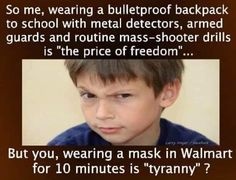Former NRA Leader Calls for Gun Control❗ To what extent do you support or oppose the actions of the NRA❓
In Act of Heresy, N.R.A.’s Former No. 2 Calls for Gun Control
The National Rifle Association’s former second-in-command is breaking with the group’s orthodoxy and calling for universal background checks and so-called red flag laws in a new book assailing the organization as more focused on money and internal intrigue than the Second Amendment while thwarting constructive dialogue on gun violence.
The former executive, Joshua L. Powell, who was fired by the N.R.A. in January, reinforces the kind of criticism made of the organization by gun control groups and state regulators, but it is the first critical look at its recent history by such a high-ranking insider.
He describes the N.R.A.’s longtime chief executive, Wayne LaPierre, as a woefully inept manager, but also a skilled lobbyist with a deft touch at directing President Trump to support the group’s objectives, and who repeatedly reeled in the president’s flirtations with even modest gun control measures.
The book, “Inside the N.R.A.: A Tell-All Account of Corruption, Greed, and Paranoia Within the Most Powerful Political Group in America,” is to be published next week, the latest public calamity for an organization that has faced years of headlines detailing allegations of corruption, infighting and even its infiltration by a Russian agent.
The attorney general of New York, Letitia James, is also seeking to dissolve the group, in a lawsuit filed last month that names both Mr. LaPierre and Mr. Powell among four individual defendants from whom it is seeking millions of dollars in restitution.
Much of the book centers on Mr. LaPierre, who Mr. Powell says “couldn’t run an organization on a fiscally sound basis to save his life,” and who filled the N.R.A.’s coffers by catering to “the extreme fringe.” So pervasive were the organization’s troubles, Mr. Powell says, that Mr. LaPierre confided in him about quitting last year, and asking Mike Huckabee, the former Arkansas governor, and Republican presidential candidate, or Jason Chaffetz, a former House member, to replace him.
Mr. Powell’s book has drawn scathing reactions from the N.R.A. Andrew Arulanandam, a spokesman, said that Mr. LaPierre spoke to many people about succession planning “if, and when, he ever left the N.R.A.” and that Mr. Powell “knows full well that the most serious ‘financial issues’ the N.R.A. confronted were the abuses of now terminated employees and vendors who abused the trust placed in them.” (In his book, Mr. Powell calls Mr. Arulanandam “the guy who became my best friend at the N.R.A.”)
Documents reviewed by The New York Times showed that weeks before Mr. Powell was fired, he was accused of improperly charging roughly $58,000 in personal expenses to the organization, a nonprofit, including airfare for himself or his family to Palm Beach, Fla., San Antonio, Phoenix and Dallas, among a number of other destinations — accusations that echo those made by the attorney general against Mr. LaPierre.
Mr. Powell subsequently agreed to repay about $40,000 to the organization, though the N.R.A. has not cashed his check as its review of his expenses continues.
A statement issued through Mr. Powell’s lawyer called the matter “a nonissue.”
“Josh’s business expenses were approved by the N.R.A. and reimbursed in the ordinary course for more than three years,” the statement said. “Expenses only became a controversy once he began to point out some of the problems in the organization. Josh hoped to just put it to rest — and so he wrote a check for more than $40,000.”
During his more than three-year tenure, Mr. Powell served at various periods as Mr. LaPierre’s top deputy, and chief of staff, and likens himself to Ned Stark, a well-meaning and ultimately ill-fated counselor to a king in the television show “Game of Thrones.”
A hunter since childhood and former Chicago options and derivatives trader, Mr. Powell says that the N.R.A. has fundamentally lost its way, abandoning “its roots as an organization focused on gun safety and education.” That has led it to limit its own long-term membership growth, he argues, by turning its back on the majority of gun owners who support background checks.
After the 2012 Sandy Hook massacre at an elementary school in Newtown, Conn., the N.R.A. rebuffed new gun control measures and instead promoted a “School Shield” program in which it would help review and recommend school safety countermeasures like arming security guards. Mr. Powell writes that he worked to boost the program after discovering it was little more than empty rhetoric — in the four years after Sandy Hook, the N.R.A. assessed the safety of only three schools.
“Wayne was out there selling the program to our members, raising money off it, claiming we were protecting kids’ schools,” he writes. “It was another example of the wizard behind the curtain — lots of inflamed rhetoric and fireworks and noise, but very little effective action on countering gun violence.”
Joel Friedman, an N.R.A. board member, said School Shield “began very slowly because it needed to be proven,” and called Mr. Powell’s book “a 180-degree flop.”
Despite the N.R.A.’s problems, its influence remains. Mr. Powell describes the organization’s officials repeatedly persuading Mr. Trump and his administration to stand down from efforts to impose gun control measures.
After the 2018 massacre of high school students in Parkland, Fla., Mr. Trump “seemed to support imposing some of the toughest new restrictions on guns in decades,” Mr. Powell writes. But the president quickly folded after a meeting with Mr. LaPierre and Chris Cox, who was then the N.R.A.’s top lobbyist.
“He was reminded who had helped elect him,” Mr. Powell writes. “After the meeting, the president did a one-eighty, completely changing his tune.”
There was a similar reversal by the president after mass shootings in El Paso, Texas, and Dayton, Ohio, in the summer of 2019. Mr. Powell helped prepare Mr. LaPierre for a call with Mr. Trump, during which Mr. LaPierre told the president “the membership would go wild” if he moved forward with background check legislation.
“That happened in the Bush years, and our people just didn’t come out in the same way,” Mr. LaPierre told the president, who once again backed down.
Yet in Mr. Powell’s telling, there was no expansive political machine that helped candidates like Mr. Trump. “As Wayne said to me on many occasions, ‘Josh, come on, you know it’s all smoke and mirrors. The Wizard of Oz. Just pull back the green curtain.’”
Mr. Powell’s critics see his turn as a tell-all book writer as self-serving. In the weeks before he was fired, he was seeking to restructure his contract and receive $1.7 million as a consultant. “My loyalty to the Association is without question,” he wrote to Mr. LaPierre at the time, according to documents reviewed by The Times.
He uses his book to address accusations of nepotism as well as an allegation against him of discrimination based on gender and an allegation of sexual harassment.
And while he was at the N.R.A., Mr. Powell took no action to reset the group’s hard-line course, a choice he discusses in the book.
“I was part of a message machine that helped to perpetuate the problem and exacerbate the extremism of the gun debate, something I wouldn’t fully appreciate for a long time,” he writes. “I would become lost. And my experience would ultimately convince me that the N.R.A. itself had lost its mission, and lost its way too.”
He estimates that a third of member dues are now being consumed by legal fees, and describes a culture where big spending was routine. Early in his three-year tenure, Mr. Powell writes, he was admonished for checking into a Sheraton hotel. “We all stay at the Ritz,” other executives told him. “Move your room.”
And he likened being hired as a senior N.R.A. executive to “Ray Liotta walking into the Copacabana in the movie Goodfellas.”
It is Mr. Powell’s comments on gun control — speaking as a former senior official at a group dedicated to opposing such change — that is the most striking. He is unconvinced that universal background checks would be effective, but he says “the N.R.A. is not in step with the majority of gun owners” on the issue and should take it off the table.
He also expresses support for red flag laws allowing law enforcement authorities to confiscate a gun owner’s weapons after warnings from relatives or friends — “as long as there is a process” that “involves both medical doctors and psychiatrists, and some sort of bipartisan oversight.”
Instead of considering such measures, the group, he writes, has been transformed into “an organization of ‘No,’ in response to any effort to quell gun violence,” and that also repeatedly blocked federal studies of gun violence, fearing their findings.
“The N.R.A. fueled a toxic debate,” Mr. Powell writes, “by appealing to the paranoia and darkest side of our members, in a way that has torn at the very fabric of America.”
To what extent do you personally support or oppose the goals/actions of the National Rifle Association (NRA) as a whole?











Comments
Post a Comment